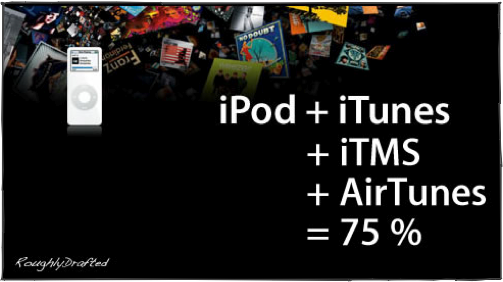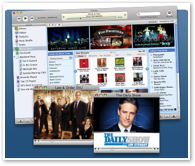





Apple is leading media download sales by a huge margin, and had sustained its lead for several years now. The company didn't fall into first place by accident however.
Apple's lead is based on platform principles that are very similar to the ones that made Microsoft successful with Windows: an understanding of technical feasibility, and a diligent effort to build a sustainable platform. Here's how Apple is putting both ideas to work.
Understanding Technical Feasibility
When Apple began offering TV downloads last year, online critics panned the marginal quality of Apple's video and the price of iTMS downloads. Bloggers demanded HD or DVD quality video, and apparently wanted the price point to be lower. If a song costs a dollar, a TV show that might only be watched once should cost less, they figured. 

This peanut gallery of critics is the same group of theoretical consumers who will never buy a horse because they're holding out for a winged, rainbow unicorn with a golden tail that emits sparkling stars. Incidentally, this is the same demographic that professed a deep interest in "Snakes on a Plane," but then didn't actually go to see the movie.
Notable platform lesson: What people think they want is frequently not the same as what they will actually buy.
Good Enough
For the majority of consumers actually interested in buying videos online, Apple's TV quality content serves a useful purpose. Titles download at a reasonable speed, and are priced low enough to consume in regular doses; they also provide good quality payback on the iPod, and acceptable quality playback on standard televisions. That's enough to get consumers choosing to frequent the iTMS.
When Microsoft introduced Windows 3.0 in 1990, it similarly found success, not by matching or bettering Apple's Macintosh, but by simply being good enough and cheap enough to exist as a viable option.
Once established, any progress Microsoft made was simply icing on a good enough cake. If Microsoft had held up Windows until it could offer a superior product to Apple’s, it would never have arrived.
In a similar fashion, Apple's iTMS is only competing against CDs and DVDs indirectly. Apple doesn't have to improve upon DVDs; it can excel by simply providing a good enough option that provides alternative advantages. Any progress Apple makes will simply be a welcomed advancement of what is already good enough to sell.
Notable platform lesson: It’s better to under-promise and over-deliver than promise and not deliver.
A Problem of Size
Understanding the technical feasibility of content downloads requires a look at the size of downloads, the costs involved, and the motivation and business model behind operating a download store. For starters, there's a huge gulf between HD or even DVD quality video, and what can be effectively delivered over the web.
Apple's TV quality content was targeted for display on the 5th generation iPods. The combination of the iPod and its video dock allowed last year's iPods to be used like a mini VCR to bring a pocket full of video programming to any attached television.
Consumers with HDTV displays and home theater setups aren't going to be happy with the state of the art in web download technology; they'll be better suited buying DVDs or paying to receive Netflix , satellite, or cable programming, much of which is now available in HD.
, satellite, or cable programming, much of which is now available in HD.
That's fine for Apple, just as Microsoft was okay with the Macintosh existing while they sold Windows to a very different market segment represented by PC users. Apple doesn’t have to be the only game in town to survive and prosper. That’s a key aspect of Apple’s success, as I’ll explain in a moment.
While HDTV is the hot new thing, it is not required by the majority of consumers, who are satisfied with standard TV programming. There is room to provide different programming options that hit both targets.
For Apple to provide HD programming in the iTMS, it would have to handle many times the bandwidth, with significantly higher associated costs. Since the proportional differences are not obvious, I created A Visual Comparison of CD, DVD, HD and iTMS content.
Case of the Missing Profit
Second, it's useful to note that Apple, despite being the clear leader in selling downloadable music and TV, is only reporting minimal profits for iTMS. There are significant costs involved in building a store, maintaining content, and accommodating large media downloads.
If Apple can't make fat profits selling five minute songs for a dollar, how will it make more money selling 90 minute movies that are 100 times bigger for just $10? 

Clearly, Apple sees iTMS content as the lubricant to sell iPods and accessories, not a huge cash cow in itself. That’s the third aspect of technical feasibility.
Exploring Apple's motivation for running the iTMS helps explain why Apple doesn't have to be all that worried about being number one in media downloads. In fact, the primary reason Apple is currently leading the download media market is because few others have a good reason to enter the high risk, low profit download market.
Barriers to Competition
Consider how Microsoft originally established its Windows platform on the PC: it had to prevent competition for pre-installed operating systems by tying hardware vendors to exclusive contracts.
That created a natural barrier to competition for Windows, because who, after getting Windows “for free” with their new PC, would go out and pay hundreds of dollars for OS/2 or some other alternative?
Apple doesn't have to stop competition to the iTMS, however. For starters, alternative stores that sell plain MP3 music are actually contributing to iPod content; they work in Apple’s favor by widening the amount of content available for its iPod players.
If users choose to buy their music on CDs or from indie MP3 outlets, Apple doesn’t lose out, because three out of four of those users will choose to buy an iPod to listen to their songs. The iTMS is an option for consumers, not a critical moneymaker for Apple.
The only possible threat to Apple’s iPod comes from stores that only sell WMA content. That threat is limited; if music or content is available in both formats, it’s no threat at all. There is only a problem for Apple if significant new content becomes exclusively available only in anti-iPod formats such as WMA, Real, or Sony’s ATRAC.
Running a media download store is already a high risk venture; there is even less chance of profitability in setting up a store that only sells content that will not play on the iPod. Doing so excludes the majority of the market!
The Dwindling Market for Anti-iPod Content
That creates an effective barrier of entry for anti-iPod stores attempting to sell WMA-only content, similar to the barriers of entry enjoyed by Microsoft’s Windows, but without actually having to risk running afoul of antitrust laws. Apple is simply offering a better product in an open and free market.
 Apple invested in the iTMS, not to make money directly, but to deliver content for its iPod platform. Nobody else really needs to deliver content for a specific platform apart from the four main vendors of DRM content: Apple, Sony, Real, and Microsoft.
Apple invested in the iTMS, not to make money directly, but to deliver content for its iPod platform. Nobody else really needs to deliver content for a specific platform apart from the four main vendors of DRM content: Apple, Sony, Real, and Microsoft.While Apple is doing an acceptable job at selling content people want, with reasonable DRM and an easy to use and simple store, Sony and Real failed miserably in their solo efforts to run a store, while Microsoft expected its WMA store partners to incur all of the actual risk and simply pay Microsoft to license its technology.
Apple is leading media downloads because it is building its own future, rather than expecting free money to fall in its lap. Microsoft apparently forgot how hard it worked to establish Windows, and expected this time around it would be a slam dunk to introduce an entirely new platform. Oops!
This All Happened Before
Apple doesn't have to be the only download store for music and video, it only has to remain open as a source of enough content to make the iPod a relevant platform. In effect, the iPod is the Mac; iTMS content is Mac software.
As long as there was enough original Mac software, Apple had no problem selling Macs. When graphic PC software titles started arrive that were not available for the Mac, Apple found it harder to maintain the Mac platform. Apple was at the mercy of Adobe, Microsoft, and others to provide software for its platform.
Apple has since learned a notable platform lesson: if you want to make sure software exists for your platform, it's a good idea to create it yourself.
A major reason why Microsoft Windows succeeded as a platform was because Microsoft was pointedly developing software for Windows itself. Microsoft also gave away developer tools so that others would build Windows software. I outlined elements in Microsoft's successful platform strategy in 1990-1995: The Rise of Windows.
Apple is now doing similar things with the Mac. It didn't wait around for Adobe to build a suite of pro apps; Apple bought or built its own. The company also built its own consumer suite of iLife apps, and is working on alternative office apps with iWork. Apple similarly offers Mac developer tools at no cost.
iTMS Programming is iPod Software
And back to the iPod, Apple is decisively working to make sure that a compatible selection of content is available to use with the iPod. The iPod got its start by adopting MP3 content, at a time Microsoft and Sony were trying to get rid of MP3s and replace them with their own brand of DRM. That was a huge mistake.
Apple built on top of MP3 compatibility with support for the more modern AAC open audio format, as well as the company's FairPlay DRM protected version of AAC, to accommodate content providers. That made DRM an option, not a demand, and let users determine for themselves how they wish to use their iPod.
In addition to protected, commercial audio and TV content, Apple has also been pushing free "developer tools" in the form of podcasting: free distribution of podcast feeds using iTunes as a directory, and low cost or bundled tools such as GarageBand for creating original music as well as audio and video podcasts.

All of these strategies are about creating content that gives Apple's iPod something to do. Related products, from AirTunes wireless distribution to the Hi-Fi speaker system, are simply peripheral for the iPod.
Rumored products, such as video-enabled AirPort wireless distribution, will only add further value to the system.
Losing Money, Hand Over Fist
That helps explain why Apple is pioneering music and media downloads. For Apple, it's all about having enough content for the iPod. Download sales don't have to turn a profit.
For retailers like WalMart and Amazon, it's either simply another bandwagon to jump upon or a defensive move related to lost hardcopy media sales; they too can afford to lose some money trying, but it’s a greater risk.
Microsoft has the same need to deliver a variety of WMA content as Apple, but it doesn’t directly profit from WMA hardware. The WMA PlaysForSure platform is a failed initiative because Microsoft only had partial ownership of the WMA music player platform.
Microsoft ended up running its partners’ profitless WMA download stores into the ground, which subsequently killed any market for its other partner’s WMA player hardware prospects.
The company has since realized that its PlaysForSure partners aren't going to stick it out for years of losses (or barely breaking even) simply to add value to Microsoft's WMA platform, or to help sell devices made by other manufacturing partners. 

That's why Microsoft has decided to abandon its partners, just like it abandoned IBM with OS/2, to build a so-called iPod-Killer platform it owns and controls outright.
Microsoft can afford to lose money for years while developing WMA as a solo effort; they've followed the same strategy with the Xbox. The difference is that while Microsoft can afford to lose money on Xbox hardware in order to get into the running for the profitable software games development and licensing business, the same strategy isn't going to fly for WMA.
Microsoft can't lose money on their iPod-Killer hardware, because there is no money to be made in breaking even on media downloads! It's simply an expensive business to run, and prices are too low. Apple is working to keep prices low, because they don't intend to make lots of money on content, they just want enough content to be available for the iPod.
How to Make Money While Losing Money
Apple’s efforts to keep media download prices low also serves to keep competition at bay, because low prices mean low profits in media downloads. That upsets media moguls like Edgar Bronfman Jr., but it’s good for consumers.
It also makes the market for video downloads ripe for Apple’s picking. If existing stores are struggling to survive selling songs, how will they turn a profit sustaining larger, longer downloads at a minimally higher price? It’s simply an expensive, profitless market to be in for companies with no hardware strategy.
Of course, there are desperate companies ready to lose money in a speculative attempts to enter the media download market. Apparently everybody wasn’t paying attention during the last Internet bubble, so we get to watch them repeat some of the same mistakes. Woo-hoo! Be sure to use their free services while you still can.
The New Bubble
Despite all the excited talk about MySpace and YouTube, there simply isn't money to be made in delivering huge streams of video downloads at zero profit, when those downloads aren't also selling profitable hardware and accessories, as Apple's do.
Prior to the dotcom crash, plenty of failed business models wrapped themselves up in the illusion that their service would somehow be "ad supported," but the reality is that no amount of ads can support bad business models. Ads aren’t doing well in supporting good business models.
MySpace might lead in web traffic, but that only makes it a greater liability for whatever rube company decides to buy it, because MySpace has to pay for all that traffic and the site isn't earning significant revenues.
Google recently bailed out MySpace in order to use it as a test lab for ads, but that doesn’t make up for the fact MySpace is burning cash for light, heat, and entertainment.
 YouTube similarly has lots of traffic, but it also has a profoundly brain-dead business model that revolves around providing expensive services for free, in exchange for displaying ignored, worthless advertising. It’s nice to provide serve free lunches, but nobody can afford to frivolously lose money forever. Just ask M.C. Hammer.
YouTube similarly has lots of traffic, but it also has a profoundly brain-dead business model that revolves around providing expensive services for free, in exchange for displaying ignored, worthless advertising. It’s nice to provide serve free lunches, but nobody can afford to frivolously lose money forever. Just ask M.C. Hammer.We might as well dial back the clock to 2001, when dotcoms were still trying to convince investors that selling 20 pound bags of dog food through the mail was a good idea, because it somehow involved the web. Coincidentally, that was the year when Real and Microsoft’s WMA platform seemed to matter. We know better now.
This Series

| | Comment Preview
 Read more about:
Read more about:

 Send |
Send |

 Subscribe |
Subscribe |
 Del.icio.us |
Del.icio.us |
 Digg |
Digg |
 Furl |
Furl |
 Reddit |
Reddit |
 Technorati
Technorati
Click one of the links above to display related articles on this page.
Why Apple is Winning in Media Downloads
Tuesday, September 12, 2006






Ad








